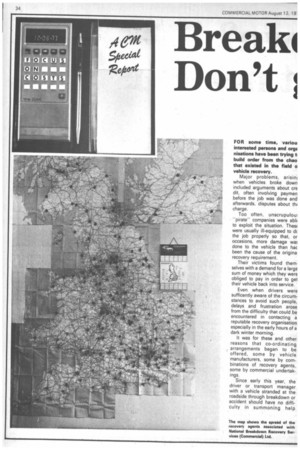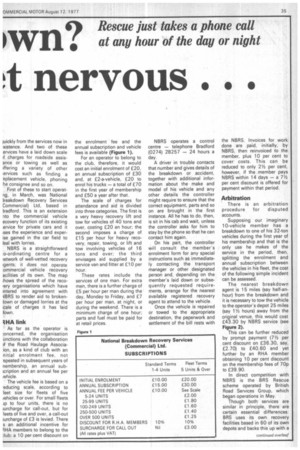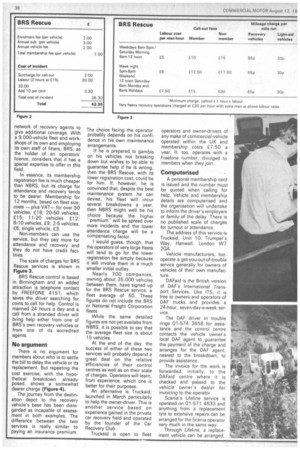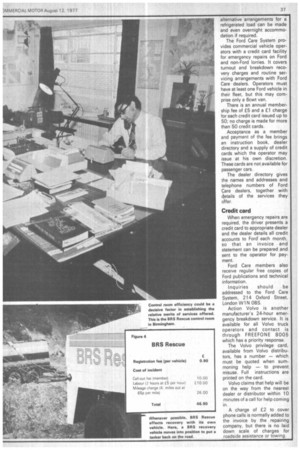FOR some time, variou interested persons and orge nisations have
Page 36

Page 37

Page 38

Page 39

If you've noticed an error in this article please click here to report it so we can fix it.
been trying ti build order from the chao that existed in the field o vehicle recovery.
Major problems, arisim when vehicles broke down included arguments about cre dit, often involving paymen before the job was done and afterwards, disputes about thi charge.
Too often, unscrupulou: "pirate" companies were abl( to exploit the situation. Thesf were usually ill-equipped to dc the job properly so that, or occasions, more damage wa: done to the vehicle than hac been the cause of the origina recovery requirement.
Their victims found themselves with a demand for a large sum of money which they were obliged to pay in order to gel their vehicle back into service.
Even when drivers were sufficently aware of the circumstances to avoid such people, delays and frustration arose from the difficulty that could be encountered in contacting a reputable recovery organisation especially in the early hours of a dark winter morning.
It was for these and other reasons that co-ordinating arrangements began to be offered, some by vehicle manufacturers, some by combinations of recovery agents, some by commercial undertakings.
Since early this year, the driver or transport manager with a vehicle stranded at the roadside through breakdown or accident should have no difficulty in summoning help
luickly from the services now in !xistence. And two of these ervices have a laid down scale if charges for roadside assisance or towing as well as iffering a variety of other ;ervices such as finding a .eplacement vehicle, phoning he consignee and so on.
First of these to start operatng, in March, was National 3reakdown Recovery Services Commercial) Ltd, based in 3radford. This is an extension nto the commercial vehicle ecovery function of its existing .ervice for private cars and it ises the experience and experise gained in the car field to teal with lorries.
NBRS is a straightforward :o-ordinating centre for a letwork of well-vetted recovery gents; it does not operate :ommercial vehicle recovery acilities of its own. The map ;hows the spread of the recorery organisations which have mitered into agreement with 1BRS to render aid to brokeniown or damaged lorries at the ;cale of charges it has laid iown, 1HA link
As far as the operator is :oncerned, the organisation unctions with the collaboration xf the Road Haulage Associaion, as a kind of club with an nitial enrolment fee, not epeated in subsequent years of nembership, an annual sub;cription and an annual fee per
The vehicle fee is based on a -educing scale, according to leet size for fleets of five tehicles or over. For small fleets ip to four units, there is no ;urcharge for call-out, but for leets of five and over, a call-out surcharge of £3 is levied. There s an additional incentive for RHA members to belong to the
a 10 per cent discount on the enrolment fee and the annual subscription and vehicle fees is available (Figure 1).
For an operator to belong to the club, therefore, it would cost an initial enrolment of £20, an annual subscription of £30 and, at £2-a-vehicle, £20 to enrol his trucks — a total of £70 in the first year of membership and £50 a year after that.
The scale of charges for attendance and aid is divided into three categories. The first is a very heavy recovery lift and tow for vehicles of 40 tons and over, costing £20 an hour; the second imposes a charge of £15 per hour for heavy recovery, repair, towing, or lift and tow involving vehicles of 16 tons and over; the third envisages aid supplied by a service van and fitter at £10 per hour.
These rates include the services of one man. For extra men, there is a further charge of £5 per hour per man during the day, Monday to Friday, and £7 per hour per man, at night, or during the weekend. There is a minimum charge of one hour; parts and fuel must be paid for at retail prices.
NBRS operates a control centre — telephone Bradford (0274) 28257 — 24 hours a day.
A driver in trouble contacts that number and gives details of the breakdown or accident, together with additional information about the make and model of his vehicle and any other details the controller might require to ensure that the correct equipment, parts and so on are brought in the first instance. All he has to do, then, is sit in his cab and wait, unless the controller asks for him to stay by the phone so that he can contact him again.
On his part, the controller will consult the member's enrolment form for any special instructions such as immediately contacting the transport manager or other designated person and, depending on the member's laid down or subsequently requested requirements, arrange for the nearest available registered recovery agent to attend to the vehicle.
Once the vehicle is repaired or towed to the appropriate destination, the paperwork and settlement of the bill rests with
the NBRS. Invoices for work done are paid, initially, by NBRS, then reinvoiced to the member, plus 10 per cent to cover costs. This can be reduced to only 21/2 per cent, however, if the member pays NBRS within 14 days — a 71/2 per cent discount is offered for payment within that period.
Arbitration
There is an arbitration procedure for disputed accounts.
Supposing our imaginary 10-vehicle member has a breakdown to one of his 32-ton vehicles during the first year of his membership and that is the only use he makes of the service in the period, then, splitting the enrolment and annual subscription between the vehicles in his fleet, the cost of the following simple incident can be assessed.
The nearest breakdown agent is 15 miles (say half-anhour) from the breakdown and it is necessary to tow the vehicle to the operator's depot 25 miles (say 11/2 hours) away from the original venue, this would cost £43.30 by NBRS service (see Figure 2).
This can be further reduced by prompt payment (71/2 per cent discount on £36.30, say, £2.70) to £40.60 and yet further by an RHA member obtaining 10 per cent discount on the membership fees of 70p to £39.90.
In direct competition with NBRS is the BRS Rescue scheme operated by British Road Services Group, which began operations in May.
Though both services are similar in principle, there are certain essential differences: BRS uses its own recovery facilities based in 60 of its own depots and backs this up with a network of recovery agents to give additional coverage. With a 9,000-vehicle fleet and workshops of its own and employing its own staff of fitters, BRS, as the holder of an operators' licence, considers that it has a special expertise to offer in this field.
In essence, its membership registration fee is much cheaper than NBRS, but its charge for attendance and recovery tends to be dearer. Membership for 12 months, based on fleet size, costs — plus VAT— for over 50 vehicles, £18; 20-50 vehicles, £15; 11-20 vehicles, £12; 6-10 vehicles, £9; 2-5 vehicles, £6; single vehicle, £3.
Non-members can use the service, but they pay more for attendance and recovery and they do not have credit facilities.
The scale of charges for BRS Rescue services is shown in Figure 3.
BRS Rescue control is based in Birmingham and an added attraction is telephone contact by FREEFONE 4151, which saves the driver searching for coins to call for help. Control is manned 24 hours a day and a call from a stranded driver will bring help either from one of BRS's own recovery vehicles or from one of its accredited agents.
No argument
There is no argument for members about who is to settle the bill to delay the vehicle or its replacement. But repeating the cost exercise, with the hypothetical breakdown already posed, shows a somewhat dearer charge (Figure 4).
The journey from the destination depot to the recovery vehicle's base has been disregarded as incapable of assessment in both examples. The difference between the two services is really similar to paying an insurance premium. The choice facing the operator probably depends on his confidence in his own maintenance arrangements.
If he is prepared to gamble on his vehicles not breaking down but wishes to be able to guarantee help if he is wrong, then the BRS Rescue, with its lower registration cost, could be for him. If, however, he is convinced that, despite the best maintenance system he can devise, his fleet will incur several breakdowns a year, then NBRS might well be his choice because the higher "premium" will be spread over more incidents and the lower attendance charge will be a compensating factor.
I would guess, though, that the operators of very large fleets will tend to go for the lower registration fee simply because it will involve them in a much smaller initial outlay.
Nearly 700 companies, owning about 35,000 vehicles between them, have signed up for the BRS Rescue service, a fleet average of 50. These figures do not include the BRS or National Freight Corporation fleets.
While the same detailed figures are not yet availabe from NBRS, it is possible to say that the average fleet size is about 15 vehicles.
At the end of the day, the success of either of these two services will probably depend a great deal on the relative efficiencies of their control centres as well as on their scale of charges. Operators will learn, from experience, which one is better for their purposes.
An alternative is Truckaid, launched in March particularly to help the owner-driver. This is another service based on experience gained in the private car recovery field and operated by the founder of the Car Recovery Club.
Truckaid is open to fleet operators and owner-drivers of any make of commercial vehicle operated within the UK and membership costs £7.50 a year. It, too, operates with a Freefone number, divulged to members when they join.
Computerised
A personal membership card is issued and the number must be quoted when calling for help. Vehicle and membership details are computerised and the organisation will undertake to inform the driver's employers or family of the delay. There is no published scale of charges for turnout or attendance.
The address of this service is Truckaid, Unit 10, Trumper's Way, Hanwell, London W7 20.A.
Vehicle manufacturers, too, operate a get-you-out-of-trouble service generally for owners of vehicles of their own manufacture.
DAFaid is the British version of DAF's International Transport Services. Like ITS, it is free to owners and operators of DAF trucks and provides a 24-hour, seven-day-a-week service.
The DAF driver in trouble rings 01-5-74 3658 for assistance and the control centre contacts the vehicle owner's local DAF agent to guarantee the payment of the charge and arranges for the DAF agent, nearest to the breakdown, to provide assistance.
The invoice for the work is forwarded, initially, to the DAFaid centre where it is checked and passed to the vehicle owner's dealer for invoicing to the operator.
Scania's Lifeline service is operated on 01-571 4633 and anything from a replacement tyre to extensive repairs can be arranged for the Scania operator very much in the same way.
Through Lifeline, a replacement vehicle can be arranged, alternative arrangements for a refrigerated load can be made and even overnight accommodation if required.
The Ford Care System provides commercial vehicle operators with a credit card facility for emergency repairs on Ford and non-Ford lorries. It covers turnout and breakdown recovery charges and routine servicing arrangements with Ford Care dealers. Operators must have at least one Ford vehicle in their fleet, but this may comprise only a 6cwt van.
There is an annual membership fee of £5 and a £1 charge for each credit card issued up to 50; no charge is made for more than 50 credit cards.
Acceptance as a member and payment of the fee brings an instruction book, dealer directory and a supply of credit cards which the operator may issue at his own discretion. These cards are not available for passenger cars.
The dealer directory gives the names and addresses and telephone numbers of Ford Care dealers, together with details of the services they offer.
Credit card
When emergency repairs are required, the driver presents a credit card to appropriate dealer and the dealer details all credit accounts to Ford each month, so that an invoice and statement can be prepared and sent to the operator for payment.
Ford Care members also receive regular free copies of Ford publications and technical information.
Inquiries should be addressed to the Ford Care System, 214 Oxford Street, London W1N OBS.
Action Volvo is another manufacturer's 24-hour emergency breakdown service. It is available for all Volvo truck operators and contact is through FFiEEFONE 8005 which has a priority response.
The Volvo privilege card, available from Volvo distributors, has a number — which must be quoted when summoning help — to prevent misuse. Full instructions are printed on the card.
Volvo claims that help will be on the way from the nearest dealer or distributor within 10 minutes of a call for help coming in.
A charge of £2 to cover phone calls is normally added to the invoice by the repairing company, but there is no laid down scale of charges for roadside assistance or towing.




















































































